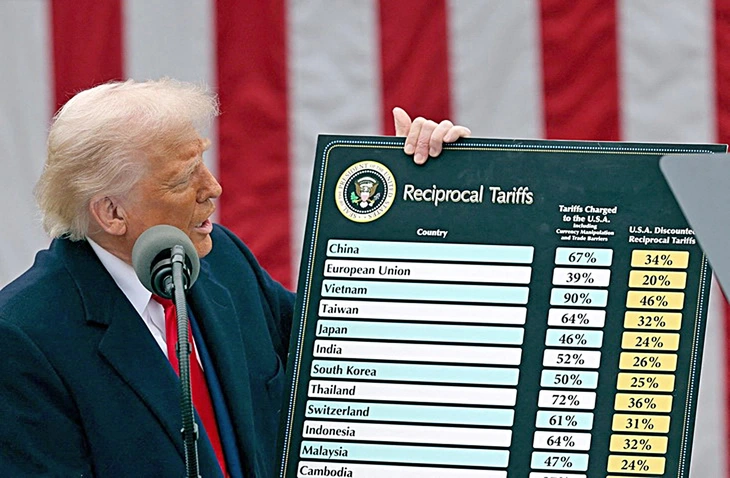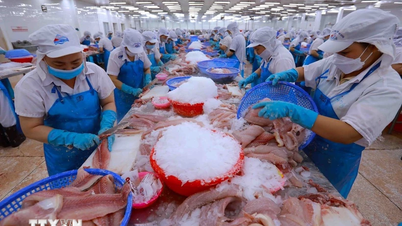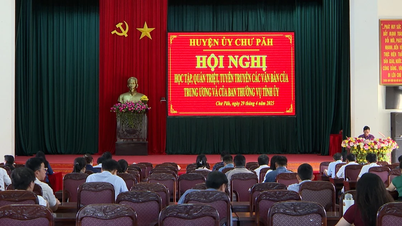Many seafood processing and exporting enterprises are affected by the new US tariff - Photo: TRUC PHUONG
What is the reaction from within the US and from Vietnam (we are subject to a 46% tax) to this tax rate?
The big picture
Accordingly, the US will apply a 10% tax on all imported goods from countries and will take effect from April 5 to respond to "unfair trade practices" and protect domestic US manufacturing industries.
In addition, additional tariffs have been applied to about 60 countries with the largest trade deficits with the US, effective from April 9, seen as a retaliatory measure to deal with these countries' trade barriers.
Southeast Asian countries are among the countries with the highest tariffs, respectively 49% for Cambodia, 48% for Laos and 46% for Vietnam. Major US trading partners are also included in this list, including China 34% (plus the previous 20% tax, bringing the total tax rate to 54%), the European Union 20%, India 26%...
Notably, Myanmar - a country facing a double disaster after experiencing a devastating earthquake that killed 3,000 people on March 28, and has been mired in a civil war for the past four years - is also among the countries with the highest tariffs imposed by the US (44%).
Mexico and Canada will not be hit with the new tariffs but will still be subject to the 25% tariff Washington imposed last month to combat fentanyl and immigration from Mexico.
However, President Trump has agreed to exempt goods from tariffs under the USMCA trade agreement between the three countries. Russia is also not on this list because sanctions from the war in Ukraine have reduced trade between the US and Russia to almost zero.
President Trump holds up a board showing the tax rates that countries are imposing on the US and their corresponding taxes - Photo: Reuters
Mixed reactions from within America
After Mr. Trump's announcement of reciprocal tariffs, businesses, trade experts, Democratic lawmakers and many American economists warned that this policy would cause prices to rise, thereby affecting economic growth.
"This is a disaster for American families. We hope the president will take a more targeted approach, as broad tariffs like this only increase prices, reduce product quality and undermine consumer confidence," said Matt Priest, president and CEO of the Footwear Distributors and Retailers of America.
In addition, the National Retail Federation stressed in a statement that these new tariffs will cause more anxiety and uncertainty for American businesses and consumers than for other countries or foreign suppliers. In addition, the tariffs taking effect immediately are "a huge responsibility" that requires careful preparation by millions of American businesses.
Meanwhile, the National Association of Manufacturers said it was analyzing the specific details and impacts, but its president Jay Timmons said the high costs from the new tariffs could threaten investment, jobs, supply chains, weakening America's competitiveness compared to other countries as well as America's leading position as the world's leading manufacturing power.
While some reactions were somewhat concerned and worried, many other organizations expressed more optimistic, even somewhat positive views.
Nick Iacovella, vice president of the Coalition for a Prosperous America, a pro-tariff organization, said today's announcement (April 2, US time) is considered "the greatest action on trade and economic policy in the history of the country", thereby cementing President Trump's legacy and helping him usher in a new golden age of economic production and prosperity.
In addition, these taxes would help "reindustrialize America on a large scale and create jobs for the working class."
Some Democratic lawmakers have criticized Trump’s new tariffs. Senator Ron Wyden said the tariffs would raise prices and increase uncertainty for businesses, according to the New York Times. In addition, Wyden said Trump’s tariff plan would not help restore American manufacturing or improve the lives of working families.
“This is essentially a tax on almost everything American families buy, so that Trump can cut taxes for his billionaire friends,” he stressed. Similar warnings have been repeated by economists, many of whom have even predicted a slowdown in growth and a spike in inflation following Trump’s tariff announcement.
Growth in the second quarter could fall by 1% because of “stronger price increases,” Nancy Lazar, global chief economist at investment bank Piper Sands, said in a note. That would hurt consumer spending more than previously thought, she said. Trump’s new tariffs are “an immediate shock to the economy.”
Meanwhile, Mr. James Knightley - chief international economist at the multinational financial group ING (Netherlands) - warned that tariffs on this scale, combined with the impact of possible retaliation from other countries, will reduce purchasing power and affect business profits.
What is the basis for tax?
Despite presenting a table of reciprocal taxes that will apply to countries, President Trump did not explain on what basis the numbers in the table were calculated.
However, according to the New York Times, the "trade barrier" figures in the table are calculated based on the ratio between the US trade deficit with that country and that country's export turnover to the US.
This shows that the Trump administration has chosen to determine reciprocal taxes based on trade deficits, instead of relying solely on the tariffs that countries impose on US goods as many initially speculated.
In addition, according to Mark Zandi, chief economist at Moody's, since returning to the White House, Mr. Trump has had an unstable approach to tariffs, constantly threatening to impose tariffs and then withdrawing them after gaining concessions from countries. This decree also includes "adjustment" authority, allowing him to increase or decrease tariffs depending on the situation.
What is US Reciprocal Tax?
* Nature: respond to taxes imposed by other countries on US exports.
* Form: tariffs, trade restrictions.
* Level: equal to or lower than the tax rate applied by other countries.
* Purpose:
- Trade negotiation tools.
- Protect domestic businesses.
- Balance of trade.
- Eliminate trade barriers that other countries impose on American goods.
* Consequences:
- Tax-retaliation loop.
- Supply chain disruption.
- Increased costs for the American people.
Source: White House, US Department of Commerce. Compiled by: DUY LINH
HA DAO - KHANH QUYNH
Source: https://tuoitre.vn/my-ap-thue-doi-ung-46-voi-viet-nam-nhieu-lo-lang-tu-ben-trong-nuoc-my-20250404075904794.htm





![[Photo] The parade took to the streets, walking among the arms of tens of thousands of people.](https://vphoto.vietnam.vn/thumb/1200x675/vietnam/resource/IMAGE/2025/4/30/180ec64521094c87bdb5a983ff1a30a4)


![[Photo] Cultural, sports and media bloc at the 50th Anniversary of Southern Liberation and National Reunification Day](https://vphoto.vietnam.vn/thumb/1200x675/vietnam/resource/IMAGE/2025/4/30/8a22f876e8d24890be2ae3d88c9b201c)
![[Photo] "King Cobra" Su-30MK2 completed its glorious mission on April 30](https://vphoto.vietnam.vn/thumb/1200x675/vietnam/resource/IMAGE/2025/4/30/5724b5c99b7a40db81aa7c418523defe)



























































































Comment (0)